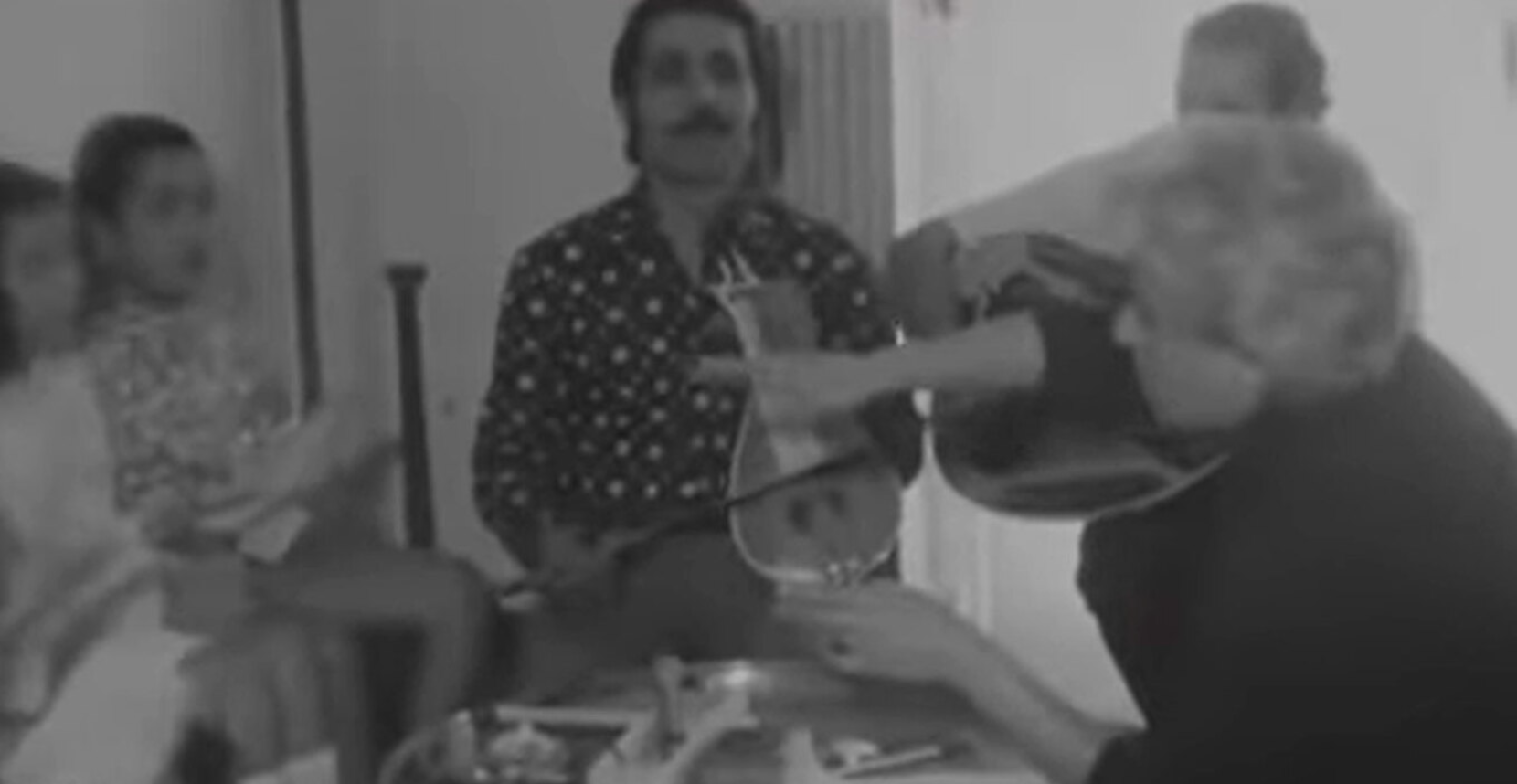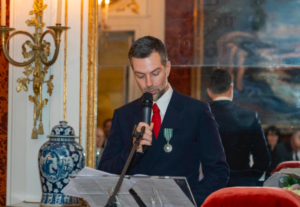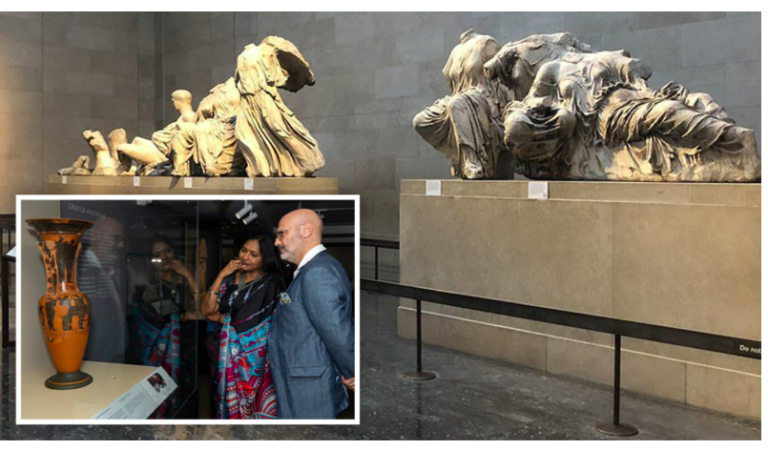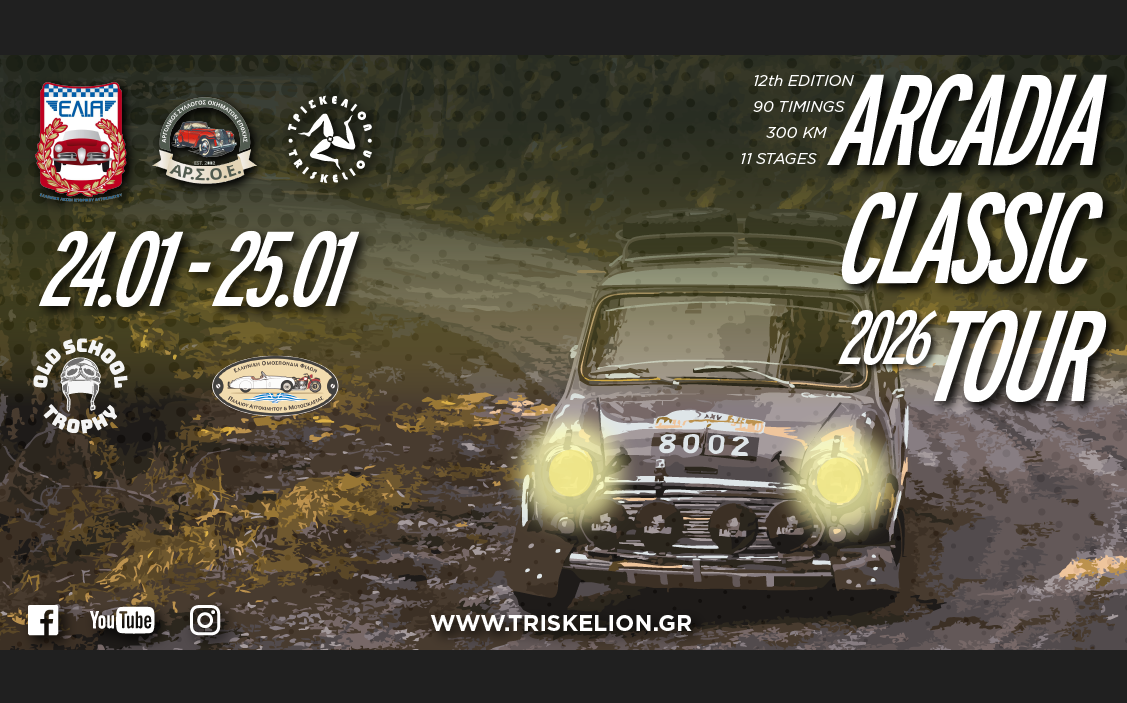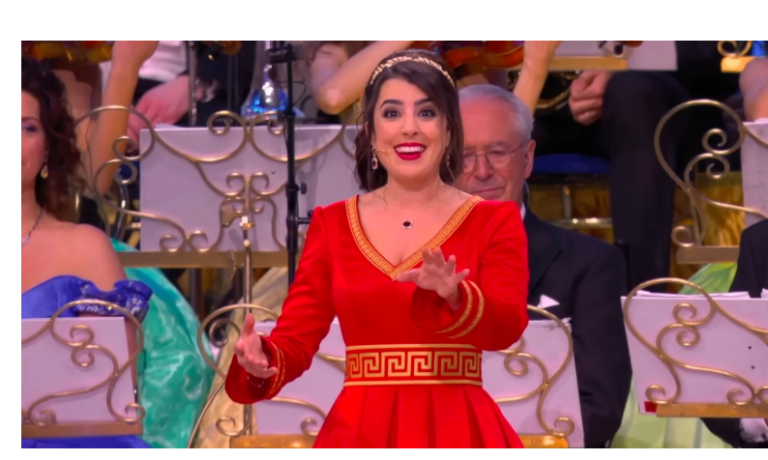The meeting was as warm and spontaneous as never before in my journalistic adventure. Here’s exactly what happened last Thursday on Xenokratous sidewalk outside a well-known café. I saw him exit the embassy’s massive car and at first contact, he hugged me, spoke to me in the familiar manner as if we had known each other for years. “Dimitri, I’m glad to see you” (in Greek)
I responded immediately, astonished: “George, how much weight have you lost?” “Not George, but Giorgos, as my mother calls me.” “As the song goes, where there’s a Giorgos, there’s gold.”
He smiled and continued, “I lost about forty kilos with significant fat loss.” He added, “I need to lose five more. I’m a member of Tatoi Club. It’s an amazing place, unlike anything any other European country has.”
And I continued, standing there before our conversation was recorded: “Since you’re from Platanos, Nafpaktia, you must have swum at that small idyllic beach in Agios Spyridon, also known as Douvia.” “Ah, I haven’t been there; now that you mention it, I might visit.”
Meanwhile, half an hour before George Tsunis arrived, Katherine Mathes and Alexandros Nafpliotis, his colleagues from the embassy’s press office, had already arrived.
We went inside, sat across from each other, him with a glass of water, nothing else, and at some point, since the bottle was near him, he filled my glass too. Such ease, such authenticity, and warmth I’ve never experienced in my journalistic career.
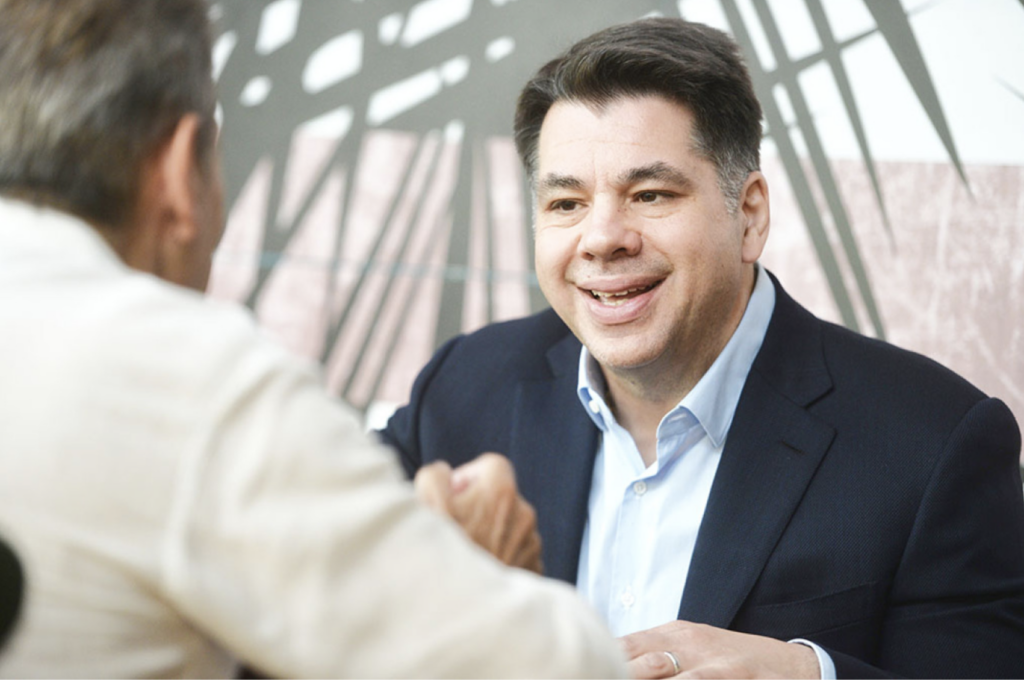
Let all those Europeans hear this, especially famous Greeks, who suffer from unbearable seriousness with limited spontaneity and sincerity. Let’s get to the conversation, mostly conducted in Greek. As he emphasized several times, “My father used to say: ‘Giorgo, never forget your roots, you are Greek.'”
DIMITRIS DANIKAS: Mr. Ambassador, how did your parents start?
GEORGE TSOUNIS: My mother and father were from the same small village in mountainous Nafpaktia called Platanos. My father left in 1953, my mother in 1961. His name was Dimitris, and my mother’s name was Eleni. My son’s name is Dimitris, and my first daughter is Eleni.
D.D.: And the third child?
G.T.: Ioanna, 12 years old, named after my father-in-law, Ioannis.
D.D.: How old is your eldest?
G.T.: 17.
D.D.: You have a 17-year-old child?
G.T.: I’m 56 years old.
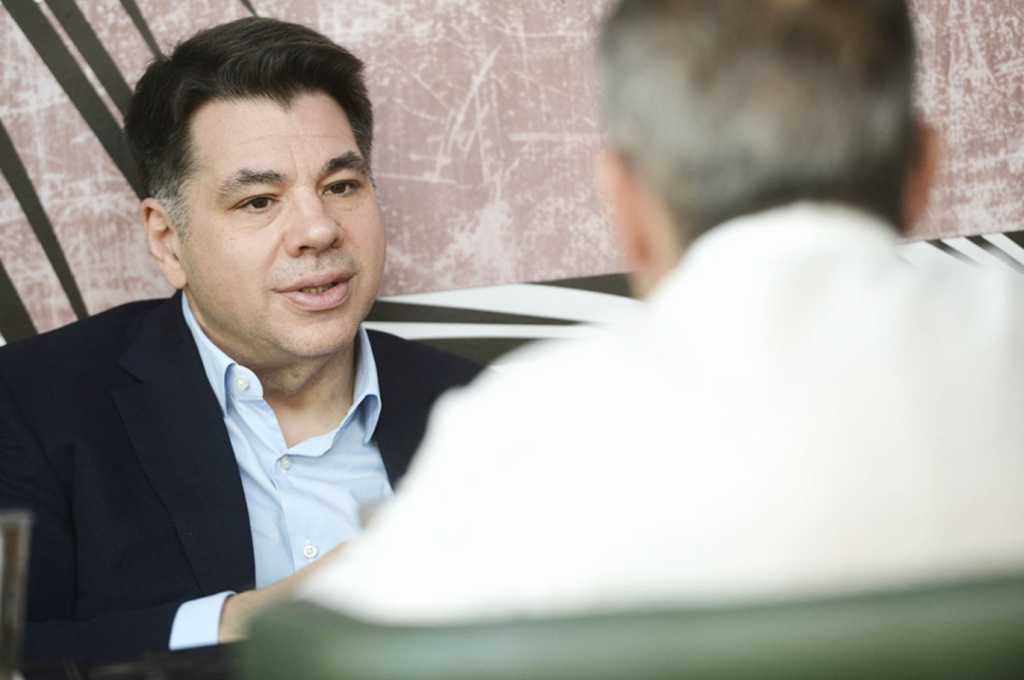
D.D.: So, your father went to America first. How did he go? Was he poor?
G.T.: They had nothing. My father was an orphan; he never knew his father.
D.D.: What did he do in Platanos?
G.T.: During those years, there was the war, and then the guerrillas came, making things very difficult. He went to high school in his village, and when he finished, he went to America by ship – it was called “Jerusalem” – and found a job at the Roosevelt Hotel restaurant in New York as a waiter. During those years, 80% of the village went to Manhattan, New York, and 20% to York, Pennsylvania.
D.D.: What era are we talking about?
G.T.: The first Greeks left in the 1850s. Some returned, and those who stayed, found work and had some money and an apartment to live in, brought their siblings, and then went back to find someone to marry. They started families, and then others from the village knew they had acquaintances in this place, America, “let’s go too.” When they arrived, they stayed at their acquaintances’ homes for the first few weeks until they got on their feet, helped them find work, and then there was a third family, a fourth, a fifth… Now in York, Pennsylvania, there are many from my village, but most went to New York. The building where my mother stayed with her family was in Washington Heights, next to St. Spyridon’s church. The building had six apartments, and in all six lived people from Platanos.
D.D.: And that’s where your father met your mother, in America. They hadn’t met in the village?
G.T.: No, my father was eight years older than my mother, and when he left, my mother was a child. When my father left in 1953, the village had 1,100 people – now it has 80. He knew her family but didn’t know my mother. The building where my mother’s family lived was where my father’s brother lived, and that’s how they met.
Scene 1: “I’ll Clean Toilets, But You Will Become a Scientist”
D.D.: Was it an arranged marriage or love? Was it by love?
G.T.: By love, but my mother waited five years for him to marry her. My father had a sister and was obliged to provide her dowry since he had no father. The first money went to help his sister and brother-in-law build their house in Athens. And my father said, “I want to do this first, and then I’ll marry.”
D.D.: And how many children did they have?
G.T.: Me, Anastasia, who is a year and a half younger, and later Vasiliki, who is eight and a half years younger.
D.D.: And they are in America?
G.T.: Yes, Anastasia and Vasiliki are teachers.
D.D.: And George Tsounis grew up there and studied law, as I read. How did entrepreneurship, the business, come about?
G.T.: Let me tell you first, if I may, what it’s like growing up as a Greek-American kid in America.
D.D.: Did you face racism?
G.T.: My parents did, in those years. America was built by immigrants, but it wasn’t always easy – not just for Greeks, but for Italians, Irish, and others. But America is a country that gives you opportunities and hope. If you want to work hard in America, you can become anything. The ten richest people in America, each with $100 to $230 billion – Elon Musk, Jeff Bezos, Larry Ellison, Warren Buffett, Larry Page, Bill Gates, Sergey Brin, Mark Zuckerberg, Steve Ballmer, Michael Bloomberg – made it themselves, they didn’t inherit it from their families. Where else does this happen with the ten richest people in one country?
D.D.: This doesn’t happen anywhere in Europe.
G.T.: Nowhere. America is a land of opportunity. It doesn’t care where you came from, where you started, what your family is.
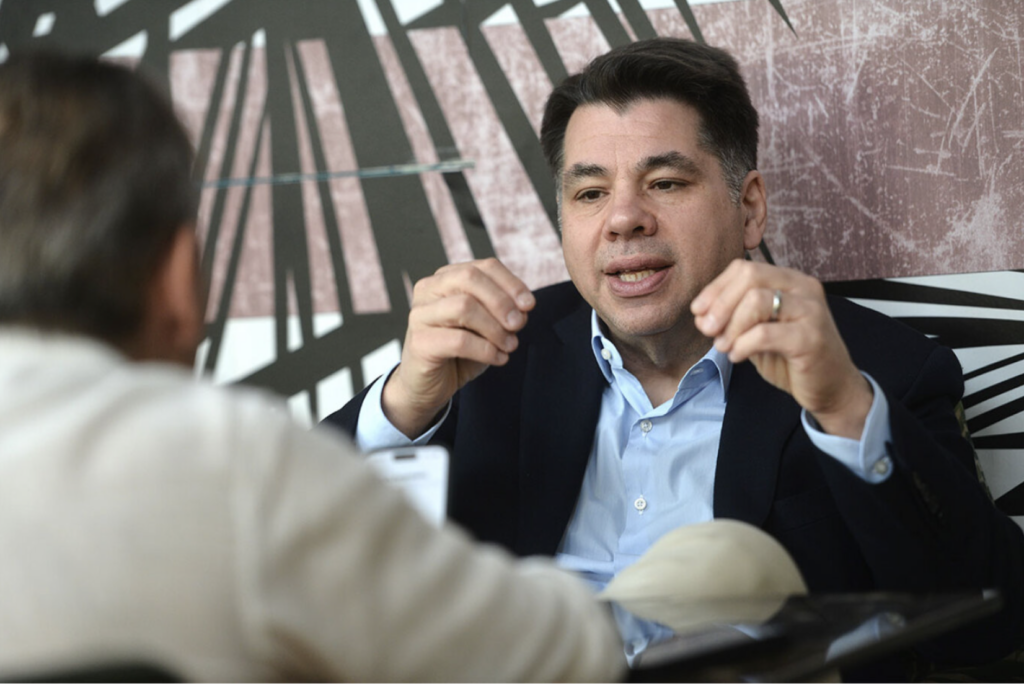
D.D.: This is the American dream.
G.T.: And we lived the American dream. My father started from nothing. When I was born in ’67, my father worked in a restaurant. But they worked hard. And my mother told me, “I don’t care, I’ll clean toilets, I’ll do whatever it takes, but you will go to school, you will become a scientist.” And that’s what I wanted to do. Because money you have one day, you can lose it the next. But education, enlightenment, that’s your foundation, that’s your wealth. And that’s what I did, and Anastasia and Vasiliki. When I went to school, at 4 years old, I didn’t know a word of English. Because at home, we spoke only Greek. And at school, I had to learn English.
Scene 2: “Don’t Bring Me a Foreign Girl”
D.D.: You went to a Greek school too, I read.
G.T.: Yes, simultaneously. Monday to Friday at the American school, Saturday at the Greek school, at St. Paraskevi church. And Sunday at church, I was an altar boy until I was 17. My mother still sings in the choir at our church.
D.D.: Your father is no longer alive?
G.T.: No, he passed away 23 years ago.
D.D.: And so you kept the Greek roots and at the same time learned English. How did you manage this mix of America with the Greek tradition?
G.T.: We Greeks of the diaspora have to hold our roots tighter. Because here in Greece, you walk outside, and everything is Greek, in America, it’s a bit harder. You have to work to find them. We had our church, certain schools, the clubs. We went on Sundays to the Platanos club, to the dances.
D.D.: There was a club there for immigrants from Platanos?
G.T.: Yes. There were clubs from Nafpaktos, from Platanos, and other villages. And all of us would go to the club on Sundays, and that’s how we stayed together. Church, club, many Greeks had restaurants, on holidays, Christmas and Easter, we had 50 people at home. And we still do. We have the lamb…
D.D.: Where do you roast the lamb?
G.TS.: At our home, in the yard. We wanted to keep our roots. My father used to say, “Don’t forget your roots.” And my mother would tell me – you’ll laugh now – “Don’t you dare bring me a foreigner.” For my mother, a foreigner was someone from Trikala, Tripoli, Kavala… “Agrinio, Karpenisi, Mesolongi, Nafpaktos,” she said to me.
D.D.: She specified it geographically.
G.TS.: Olga’s family is from Agios Dimitrios. It’s a neighboring village, 17 kilometers from Platano. I managed it! And Olga’s Greek is perfect, better than mine. The first language our children learned was Greek.
D.D.: I must say, what you are saying moves me. It’s like watching a movie. It reminds me of Kazan’s “America, America.”
G.TS.: I’ve seen it.
D.D.: It very much reminds me of this whole thing, chasing the American dream while carrying all the Greek tradition behind them.
G.TS.: It wasn’t easy for my mother and father, in poverty, without money, without knowing the language, in houses without electricity, without water, without toilets, to leave the village and come to New York and start life anew.
D.D.: And where did you meet Olga?
G.TS.: I knew her family. Olga is five years younger, but I knew her sister, who is my age, and we were friends. I knew Olga from weddings and such, and 21 years ago, we were at a dinner party at a restaurant, and I met her, and a month later, we got engaged.
D.D.: Immediately!
G.TS.: The second time we went out, three days later, Friday night, I knew we were going to get married. And she knew it too. On Saturday, I had to go to York, Pennsylvania, for my cousin’s memorial service, and I went with my two sisters and my mother. On Sunday, I’m at the memorial service in York’s church and I see on the ceiling three big icons: Saint Barbara, Saint Sophia, and Saint Olga. And my sister Anastasia nudges me, and I say to her, “Yes, I see it.” It was the first time I saw an icon of Saint Olga. What can I say, God did something from above. Four weeks later, we got engaged; we’ve been together for 21 years and have three children.
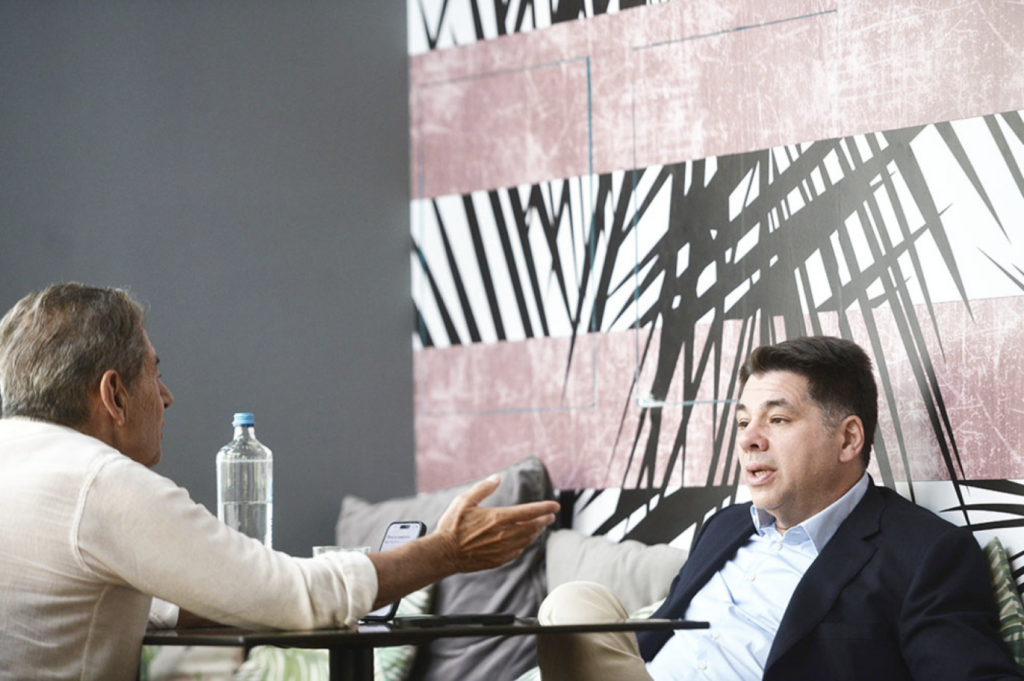
D.D.: What does Olga do?
G.TS.: She has a doctorate in physiotherapy. She is much smarter than me.
D.D.: Does she still practice?
G.TS.: No, she stopped. She is a Greek mother, with the kids.
D.D.: When you met Olga, you were both a lawyer and already into business. What did you start with first? The hotel?
G.TS.: The first thing I bought was a plot of land to build a storage facility, warehouses. In the first years, I got 2%, 5%, 8%, and in 2004 I bought my first hotel, a “Radisson.” And from then on, I had a lot of luck in my life.
D.D.: Meaning? What is luck? Is it coincidences, connections, doors, opportunities?
G.TS.: Everything.
Scene 3: “The Greeks should know that we stand by them”
D.D.: And your relationship with politics? Are you with the Democratic Party?
G.TS.: I don’t care about Democrats or Republicans. I was in the Greek Lobby, dealing with Greece’s national issues. That’s why I got into politics. Now I don’t do politics as an ambassador. I’ve known President Biden for 20 years, back when he was chairman of the Foreign Relations Committee and loved Greece, knew the Aegean issues, and we discussed how we could have stability and help Greece.
D.D.: You were very concerned about Greek interests.
G.TS.: Back then, I worked a lot with Endy Zemenides, who was the executive director of HALC, the Hellenic American Leadership Council. The two of us worked hard on these issues until I became an ambassador.
D.D.: At that time, there was no suspicion that you would become an ambassador.
G.TS.: The first thing I did was in 1987 when Dukakis ran for president. I was still a student. We all got into politics to have the first Greek president in America. And later, when I grew up and had a job and could help more, I did.
D.D.: So, the interest in politics comes from the interest in Greece, and you are neither with the Republicans nor the Democrats.
G.TS.: I am with both Republicans and Democrats who love Greece and want to help it. Today, Senator Booker, a Democrat, left. Last week, I had six senators here, most of them Republicans. The week before, I had five Republicans led by Jerry Moran and one Democrat, Senator Gillibrand. They all come to Greece and meet with the Prime Minister, Mr. Mitsotakis, Mr. Dendias, and learn how America and Greece can work together. Because Greece acts with values and principles. And it is an effective and capable ally of the United States. And the US appreciates the way Greece moves on the international stage, and relations are closer than ever. Greece is NATO’s main ally in the region. Secretary of State Blinken came to Chania, to the Prime Minister’s house. And he said, “In the 30 years I’ve been a diplomat, I’ve never seen US-Greece relations as tight, as good.” And they will get even better. This is the work I do every day because I want every Greek man and woman to know that we, America, stand by Greece. No matter what happens.
D.D.: And America’s best ally in NATO in the surrounding region is Greece.
G.TS.: Yes. It’s a democracy, it has values and principles. Just look at tourism. Two years ago, 800,000 Americans came to Greece, and last year 1.4 million. This year it might reach 2 million. Ten years ago, there wasn’t even one direct flight. Now there are 82 a week, and in two years, there will be more than 100. US-Greece relations are very tight. And now look at the American companies coming to Greece: Pfizer, Cisco, Google, Amazon Web Services, Microsoft… They come and make investments worth billions of euros. And another important thing is universities. I think that having American students come to Greece and having Greek children go to America to study is very good. In Greece, for years, universities were only public. I respect that and wish these universities to be the best there are. But now students have the opportunity to go to non-state universities.
D.D.: Are there any American universities interested? Do you know of any cases?
G.TS.: On this matter, I was in Boston last weekend, at two universities. We work every day to bring American universities here. Our embassy was at NAFSA (National Association of Foreign Student Advisers) in New Orleans with Greek universities, on how we can do joint degrees. In October-November 2022, 30 universities from America came to Greece to work with Greek universities and exchange students. Columbia University Ivy League created the 10th Columbia Global Campus here in Athens. A week ago, I was with Texas A&M, a very large and renowned American university, which came here, and we went to the Agricultural University of Athens, where I gave a speech. All this is to give all Greek children and all American children the opportunity to study wherever they want. If someone wants to go to a Greek university, good for them! If they want to go to a foreign one, good for them too! If they want to go to a non-state one, let them do it, why not. Democracy, which was born here in Greece, means freedoms and values, freedom of self-determination. Here for the first time in history, people decided how they wanted to be governed. Democracy is the springboard for all freedoms. And one of them must be the freedom of choice. The freedom to love whoever you love, to be who you are, to have opportunities, freedom of religion, freedom to choose the education you want. And we should respect everyone’s choices.
D.D.: I fully agree with you. Let’s go back to the years before the embassy. You were involved in the Greek lobby, defending Greece’s interests. At the same time, your personal and professional life was progressing. Did you have other business activities besides hotels?
G.TS.: Yes, I did shopping centers, apartments, factories. Most of what I did was hotels, but I also made other investments. I stopped practicing law in 2004-2005 and started dealing full-time with real estate.
Scene 4: “I love my children, your children, the children from Syria”
When he started talking about immigrants and refugees, he almost started crying. The past has haunted his soul. Everyone who accuses and mocks should hear this. All those who speculate for votes from the naive.
D.D.: I read that your personal fortune is 110 million.
G.TS.: When I said, “I’m lucky in this life,” I meant it. But the greatest wealth is your health, your family, and your friendships. And I have Olga, three children, health in the home, food on the table. Not everyone has this. And this is what we should think about. We are very lucky to live in Greece and have opportunities. There are 117 million displaced people, and half of them are children. Imagine a mother taking two small children, 4 years old and 2 years old, getting on a small boat and leaving her home because of war or hunger. And trying to come somewhere where they will have opportunities, will have a life. And many try to come to America, to Greece, to France, to Germany, to England, not because they want to ruin this country, but because they want to give their children a chance. The same thing my mother and father did for us. And we need to help with this. Not just our own family, our own neighborhood, our own state. We need to think of everyone. I love my children. I love your children. I love the neighbor’s children. I love the children coming from Syria… What fault do these children have? I hope these children have a chance to live without fear, to have the opportunity to go to school, to have a good life, to have families and children, to study and become something. This is not only right for civil society, it is also right for our economy.
D.D.: Tell me more specifically.
G.TS.: Look at the West, America, Europe, their aging population. We need manpower in Greece and in other countries. In construction, health, tourism, agriculture. We don’t have farm workers. Let’s give jobs to the people who are here, put the children in school, let them learn Greek.
D.D.: A migrant’s son advocating for migrants.
G.TS.: I am grateful. Look, I am very good friends with Giannis Antetokounmpo. He is a huge Greek, a huge Greek! His parents are from Nigeria, but I don’t know a bigger Greek than Giannis. I will go to his wedding in August. Huge Greek! And he will now play important games for Greece. And I know Kostas, Alex, Thanasis, their mother. Greece gave him an opportunity and Giannis built a house here, vacations here. When he finishes with the NBA, he will raise his children here. This is what others want too, opportunities for everyone. No one wants to ruin Greece, to change Greece. I want us to have legal immigration, legal asylum, the law is the law, and I respect that. And for those who are here, let’s give them a chance to work, pay taxes, help the economy, have a good life.
D.D.: What you say is very moving. The fact that a Greek-American ambassador speaks for migrants, the weak, moves me, really.
G.TS.: My parents and my family have lived through this. And I think the opportunities America gave my family helped them. As I also think my family helped America.
Scene 5: “I like stopping in villages for coffee”
D.D.: What is George Tsounis’ daily routine, apart from the embassy? Does he go anywhere? Where does he eat? Does he go to the cinema, theater? What does he do when he finishes his work?
G.TS.: I have two jobs. During the day, I am at the embassy, meetings, meetings, meetings until the afternoon. From 7 o’clock until the night, speech, speech, speech, I will go to a dinner, many speeches.
D.D.: For God’s sake! Isn’t this tiring?
G.TS.: It is. But I love the job and the opportunity to go and meet Greeks. I walk everywhere I go, I don’t want to go by car.
D.D.: And where does the ambassador go?
G.TS.: From Alexandroupoli to Pylos, from Ioannina to Mani.
D.D.: With the family?
G.TS.: Both with the family, but for my work.
D.D.: For vacations?
G.TS.: Vacations are in the village. I go many times a year, there is also the festival on August 23, and I will be there. All parts of Greece are beautiful, I don’t want to distinguish them. I have been everywhere, not only to islands. I like villages, I like stopping in villages for coffee.
D.D.: Did Tsounis read Greek literature in America?
G.TS.: When I was a student, I could do it. Now I have difficulty, it takes me 30 minutes to read one page. If you don’t do it every day…
D.D.: Did you read Papadiamantis?
G.TS.: I read Kazantzakis. And Homer. “Iliad,” “Odyssey,” and Sophocles, “Antigone.” The best lessons you will learn in your life you will learn from the ancients. When I was at university, I studied Classics. Sophocles’ “Antigone”: “It is not a shame to make a mistake, the shame is not to correct it when you know it is a mistake.” This lesson helps a lot. Aristotle: “All the love you have for others comes from the love you have for yourself.” Also, “know thyself” is very important, as is “one thing I know, that I know nothing.” Today is the 27th of the month. I know what I know until today. And I know what I don’t know. But I will try every day to learn what else I need. All Western thought starts from Greece. We all owe a debt to the ancient Greeks, because they gave us light. And I am proud that I am Greek and could read them.
D.D.: The American ambassador declares he is proud to be Greek.
G.TS.: Now I am the American ambassador, I know my job. But I am an American of Greek descent. We should all be proud of our heritage. And I am 100% proud. Someone could say that George is a huge Greek. I will finish the job in seven months.
Epilogue: “I will never forget the love Greece has shown me”
D.D.: Ah, you are finishing now?
G.TS.: My job ends at the end of January.
D.D.: But you can get an extension, right?
G.TS.: It can’t always be “me, me, me.” We need to give someone else the opportunity to do the job.
D.D.: So, you will go back then?
G.TS.: Yes. Greece is in my heart, I will be here to help Greece, but we will have another ambassador.
D.D.: Ah, many will be sad about this. Because they see you as a Greek, not a Greek-American.
G.TS.: My father used to say: “Deeds, my child, not words.” And I need to give the opportunity to someone else to do the job.
D.D.: From all the experience you had in Greece, what is the biggest thing you keep?
G.TS.: I can’t believe the love, the kindness, the hospitality that Greeks have shown me. I walk down the street, they stop me, I go to a restaurant, they come to the table and talk to me, they give me so much joy. I will never forget the love that Greece and the Greeks have shown me.
As he was leaving, he gave me his mobile number. And he asked me: “When are you going on vacation?” “In August,” I replied and continued: “Come to Kourouta for fish soup at ‘Achilleion,’ you’ll lick your fingers.” In the singular, of course, because the conversation was completely personal.
And he said to me: “Call me, I will be across and I assure you I will come to swim and eat together.”
What can I tell you, George was unforgettable!
Ask me anything
Explore related questions

